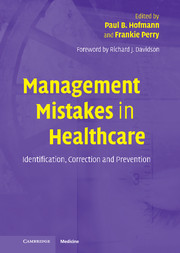Book contents
- Frontmatter
- Contents
- Notes on the contributors
- Foreword
- Preface
- Acknowledgments
- Part I Addressing management mistakes in healthcare
- 1 Acknowledging and examining management mistakes
- 2 The context of managerial mistakes
- 3 Identifying, classifying, and disclosing mistakes
- 4 What medical errors can tell us about management mistakes
- 5 Correcting and preventing management mistakes
- 6 A question of accountability
- Part II Case studies of mistakes in healthcare management
- Suggested further reading
- Index
- References
4 - What medical errors can tell us about management mistakes
Published online by Cambridge University Press: 12 October 2009
- Frontmatter
- Contents
- Notes on the contributors
- Foreword
- Preface
- Acknowledgments
- Part I Addressing management mistakes in healthcare
- 1 Acknowledging and examining management mistakes
- 2 The context of managerial mistakes
- 3 Identifying, classifying, and disclosing mistakes
- 4 What medical errors can tell us about management mistakes
- 5 Correcting and preventing management mistakes
- 6 A question of accountability
- Part II Case studies of mistakes in healthcare management
- Suggested further reading
- Index
- References
Summary
Introduction
Since the early 1990s, and particularly since the publication of the Institute of Medicine Report, To Err is Human: Building a Safer Health System (Institute of Medicine 1999), the problem of error in medicine and healthcare has received new attention. What had been a silent embarrassment for the healthcare profession – hurting patients who came for care – has been bathed in the light of scrutiny by physicians and others (Leape 1994; Finkelstein et al. 1997). These loyal critics have called for recognition of the difference between a culture of “blame and shame” that has often characterized the treatment of error on the part of healthcare professionals and a culture of organizational learning, one that locates the way to reduce error in the systems and structures designed to produce it.
In this chapter, I argue that many of the lessons learned in the field of medical error can be effectively translated into the area of management error. I begin with a brief summary of the work of two systems theorists. I illustrate some important lessons about medical error by means of a short case narrative, including analysis of it in light of a management policy designed to promote a non-punitive environment for error reporting. Contrasting the “blame and shame” approach with a newer understanding of responsibility for error reduction, I suggest that in both medical and management error, cultural factors play an enormous role.
- Type
- Chapter
- Information
- Management Mistakes in HealthcareIdentification, Correction, and Prevention, pp. 74 - 83Publisher: Cambridge University PressPrint publication year: 2004



